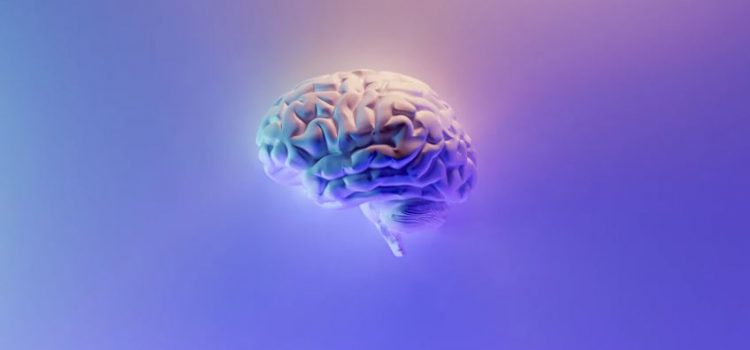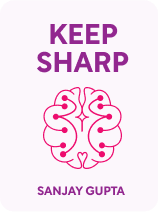

This article is an excerpt from the Shortform book guide to "Keep Sharp" by Sanjay Gupta. Shortform has the world's best summaries and analyses of books you should be reading.
Like this article? Sign up for a free trial here .
What is the key to a healthy aging brain? What are some things you can do to slow down cognitive decline and ward off neurodegeneration?
Prevention is the most effective antidote to neurodegenerative diseases and cognitive decline. There are five key areas to focus on when trying to improve your brain’s health: exercise, sleep, nutrition, discovery, and social connection.
Here’s how to keep your brain healthy as you age.
1. Exercise
In his book Keep Sharp, Gupta explains how to keep your brain healthy as you age. The single most important thing to do for a healthy aging brain, he claims, is regular exercise. Exercise helps the brain in two main ways:
1. Exercise controls blood sugar: When you exercise, the sugar in your blood is used to fuel the muscles in your body instead of staying in your bloodstream. This prevents consistently high blood sugar and keeps your insulin levels stable.
2. Exercise reduces stress: When you’re stressed, your body releases a hormone called cortisol, which has been linked to changes in the brain. People who experience chronic stress early in life are much more likely to suffer from mental problems and mood disorders later in life.
Physical inactivity, on the other hand, sharply increases the risk of cognitive decline. Gupta points to a study that states that lack of exercise is the most significant risk factor in developing dementia. Prolonged sitting (sitting for eight or more hours a day) can be especially harmful. Not only does prolonged sitting increase blood sugar levels, but it also negatively affects blood fats, cholesterol, blood pressure, and leptin (the hormone that tells you when to stop eating). When your muscles are dormant for too long, they begin to break down and atrophy, and your body’s ability to break down calories is weakened.
2. Sleep
Gupta claims that our brains perform billions of molecular tasks while we sleep. Because of this, sleep keeps us sharp, creative, and able to process information. Sleep keeps our brains healthy in three key ways, says Gupta:
1. Sleep controls our hormonal cycles: Our circadian rhythms revolve around our sleeping habits, and these rhythms dictate our hormonal patterns. These hormonal patterns help regulate our appetites, stress levels, and cellular recovery. People who don’t get enough sleep on a regular basis are likely to have issues with their metabolism and stress levels—and thus, their brain’s function.
2. Sleep helps us encode memories and process information: A recent theory suggests that our brains consolidate our memories during sleep. Essentially, while we sleep, our brains move information from our short-term to our long-term memory. Furthermore, when we don’t sleep enough, our brains lose the ability to process information at all. In other words, not only do we struggle to remember things later on, but we also struggle to even take in the information in the first place.
3. Sleep helps our brain’s cleansing process: Recent studies show that our brains remove excess waste through something called the glymphatic system. When we sleep, this system greatly increases its output. Sleep helps get rid of the waste from our metabolic system, which includes the amyloid plaques that have been linked to dementia.
3. Nutrition
Gupta claims a healthy diet is a vital part of brain health. As we’ve discussed, metabolic disorders are thought to be a leading factor in cognitive decline. While there is no general consensus on the perfect diet for brain health, there is plenty of evidence to suggest that you should eat certain foods regularly and avoid other foods as much as possible.
Foods to Eat
Most of the foods that are good for your brain should not come as a surprise. Gupta claims that, although it’s difficult to know exactly how foods interact in our bodies, recent studies point to certain diets as being particularly healthy. For example, a Mediterranean diet is extremely beneficial to brain health. This diet consists largely of olive oil, nuts, fish, and a wide variety of fruits and vegetables.
Of these foods, Gupta mentions that berries and leafy green vegetables are especially good for the brain. One reason for this is that they are high in fiber. Fiber is beneficial because it changes the way your body metabolizes food. If you don’t have enough fiber in your diet, the carbs you consume will be absorbed more quickly, which increases your blood sugar and insulin levels, contributing to cognitive decline. Gupta also points out the benefits of omega-3 fatty acids, which are found in fish, nuts, seeds, and plant-based oils like olive oil. Omega-3 fatty acids are crucial in the maintenance of neurons.
Foods to Avoid
In a typical Western diet, there are three ingredients we consume too much: sugar, salt, and saturated fats. We’ll go through each one and discuss why Gupta feels they are bad for the brain.
Sugar: The average American consumes 163 grams of sugar per day. Most of this usually comes in liquid form or from processed foods. Earlier in the guide, we discussed why high levels of sugar in the blood can be bad for the brain: They can make us insulin resistant, leading to diabetes. They can also lead to high levels of inflammation, which can lead to cognitive decline.
Salt: Although Gupta doesn’t go into much detail about why salt is bad for you, he does recommend limiting your intake of it as it has been linked to higher levels of heart disease, stroke, and dementia.
Saturated Fats: Saturated fats are in foods that are typically solid at room temperature, like cheese, butter, and full-fat yogurt. They can also be found in fatty red meats and milk. Saturated fats raise cholesterol and blood pressure levels and, like salt, have been linked to higher levels of chronic diseases.
4. Learning and Discovery
Gupta argues that keeping your brain active is a vital part of maintaining its health. Learning or discovering new things stimulates the brain, and this stimulation builds a brain more resistant to disease by creating new neural connections (and strengthening existing ones). With stronger neural connections, you are less susceptible to cognitive disruption. With a greater quantity of neural connections, you can offset the disruption through the use of the other networks. This may be how some people whose brains show all the physical signs of Alzheimer’s don’t manifest any symptoms of the disease.
Ways to Stimulate the Brain
Gupta says that the best way to stimulate the brain is through challenging and novel activities. Doing this will increase the brain’s ability to adapt to damage or other challenges (or what scientists call your “cognitive reserve”). When many people think of brain stimulation, they think of brain games or puzzles. While these are helpful for working memory, they aren’t as beneficial for things like problem-solving or reasoning, which are also a big part of cognitive reserve. For this reason, you are much better off taking a class on something you enjoy, learning a language, or doing some other complex skill that gets you out of your comfort zone.
5. Social Connection
Gupta claims that social interaction is crucial to our psychological well-being and thus our brain health. There is lots of evidence to support this, as strong social connections are a better predictor of long, happy lives than social class, intelligence, or genetics. Lack of social connection has been linked to disrupted sleep patterns, higher levels of inflammation, and higher levels of stress, all of which contribute to cognitive decline.
From an evolutionary perspective, the importance of social connection makes sense. Humans are a very social species. Throughout history, we’ve survived through communal living and reliance on others for food, water, shelter, and protection. In the modern world, as Gupta points out, social isolation is on the rise. Despite being connected to many people through digital media, many people lack real, close connections. If we wish to counteract this and preserve brain health, we must focus on building community with others and establishing meaningful relationships.

———End of Preview———
Like what you just read? Read the rest of the world's best book summary and analysis of Sanjay Gupta's "Keep Sharp" at Shortform .
Here's what you'll find in our full Keep Sharp summary :
- The steps you can take to prevent cognitive decline such as Alzheimer’s
- How to keep your brain strong and resilient throughout your life
- Foods to eat and avoid to maintain brain health






